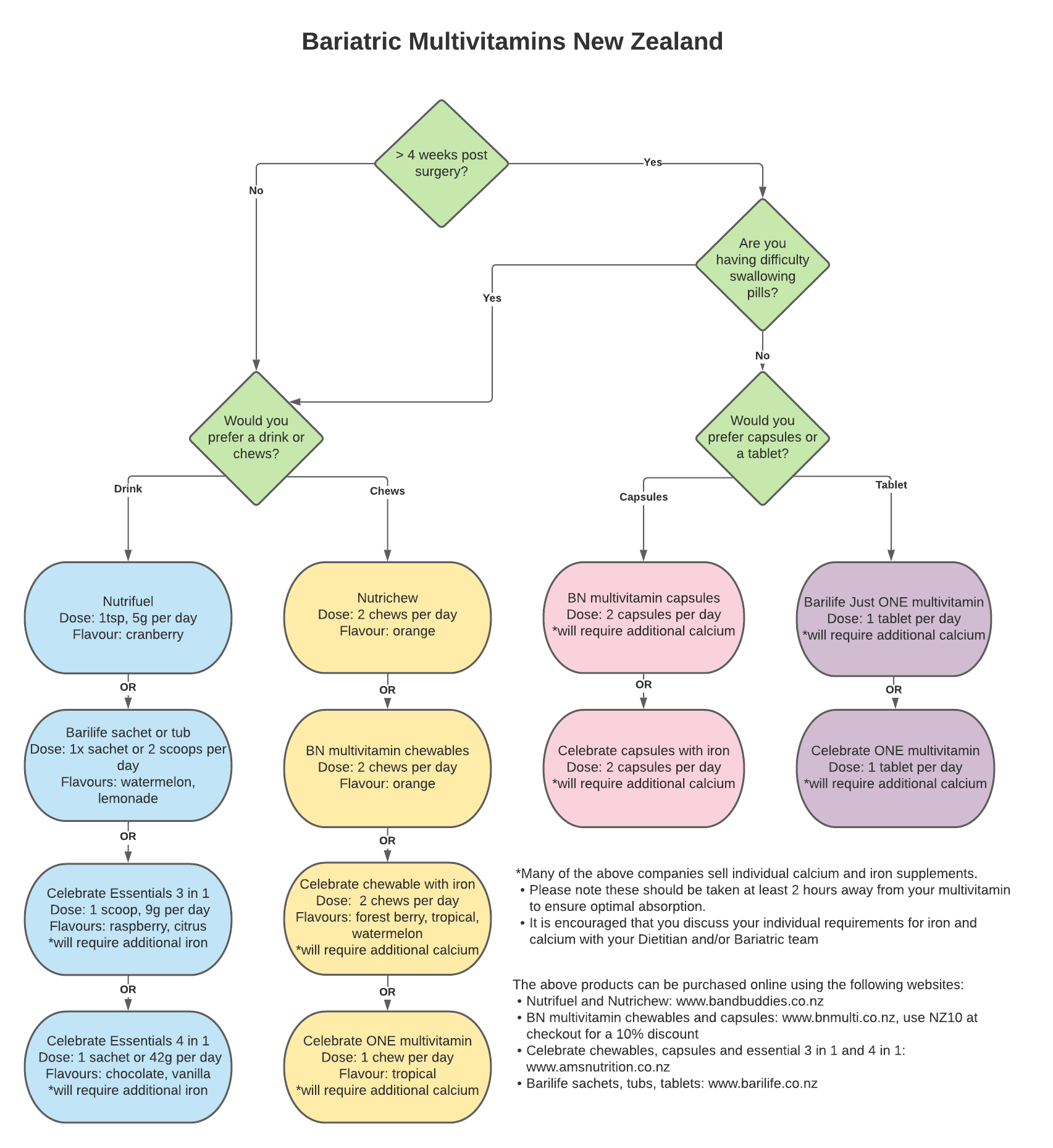
Multivitamins following surgery - is it all a bunch of malarkey, or are there valid reasons for needing a multivitamin for the rest of your life? Research shows that for the first year or two following bariatric surgery, people are reasonably good at taking their multivitamins, however, over time compliance declines and as little as 37% are taking their multivitamin by 4 years post surgery (Ha et al). As much as a burden it may seem, understanding the reasons behind the importance of taking a good multivitamin after bariatric surgery can be found below:
Vitamins and minerals you are more likely to be deficient in following bariatric surgery
- Iron
- Calcium
- B12
- Thiamine
- Vitamin D
- Vitamin A
- Zinc
Why, Why, Why…
- Less stomach tissue = less hydrochloric acid and intrinsic factor needed convert specific nutrients into forms you can absorb
- Malabsorption - in bypass and duodenal switch procedures part of the small intestine where you would normally absorb many vitamins and minerals is bypassed
- Reduced food intake - it is impossible to get all the nutrients you need when eating a low calorie diet. Even as portions increase, research has shown that 96% of people will have at least 1 nutrient deficiency following surgery (Ha et al)
- Less dietary variety - food intolerances are common after surgery with many people struggling with red meats, tough/stringy meats, dairy products, fibrous fruits and vegetables and ‘sticky/doughy’foods. This reduces the range of nutrients you are exposed to and can contribute to nutrient deficiencies
But what if you don’t tolerate your current mulitvitamin?
There are a range of reasons why people may not tolerate their multivitamin such as difficulty swallowing the pill or capsule, dislike of the taste or gastrointestinal symptoms such as nausea or a sore stomach. It’s true, it can take some time to find the right multivitamin best suited for you however below are a few tips and tricks to try first before switching brands:
- Blend it into your protein shake
- Crush it or open the capsule and mix it into your food
- Always take it with food or soon after eating a meal
- Try taking it at a different time of the day
Failing that, you may like to try a different option. This can be an expensive process if you end up trying 3 or 4 different types, so below are a few tips that can help to manage the cost:
- Contact the supplier and request a sample first
- Ask your Dietitian if they have any samples when you are next in clinic
- Share the love - if you have a friend, family member or colleague who has also had surgery pool your supplies and try each others’
You may also find the following multivitamin flow chart useful for working out the best option for you:

Can’t you just buy one from the supermarket?
The simple answer is no. A general multivitamin designed for Joe Bloggs to take as a supplement to his usual diet with his usual sized stomach and un-altered intestinal tract is not going to cut it for someone who has had bariatric surgery. Even if they taste super yummy, are easy to take and taste just like a lolly (hello gummy multivitamins), you find from the information panel that most general multivitamins don’t contain enough iron, B12, caclium, vitamin D or zinc and copper or sometimes these are missing altogether! Given these nutrients are particularly important following bariatric surgery, why would you risk taking a sub-par option?
But they’re so expensive!
Supplements can be pricey, and this is a key reason why people may stop taking their multivitamin after surgery (Smelt et al), however when considering the reduction in food and alcohol intake, you’re still likely to be quids in by the end of the month. And besides, what price would you pay for good energy levels, better concentration, improved immunity and well supported bone heath? Depending on the brand you go for, you are looking at a cost of $1-2 per day.
I appreciate the importance, but I keep forgetting…
Like brushing your teeth, taking your multivitamin each day needs to become a new habit and part of your daily routine. Similar to the desire of avoiding furry teeth, avoid low energy levels, bone pain, frequent illness, muscle pain and tingling hands and feet by:
- Placing your multivitamin bottle in a place you’ll see it daily e.g. by your toothbrush, kettle, bedside table or car keys
- Keep a bottle at home, at work and in your suitcase
- Set reminders or alarms on your phone
- Use a bariatric app such as Baritastic to track intake
- Create an old fashioned tick or star chart to record intake
- Get a pill box
- Ask friends or family to help keep you accountable
How do I know if my multivitamin is making a difference?
Two words - regular bloods! For the first year following surgery, blood tests are done fairly regularly e.g. every 3 months to help pick up on nutrient deficiencies while you adjust to your new stomach, however as portion sizes increase and weight loss stabilises, it is encouraged to get a comprehensive blood test done at least once per year. This will help to pick up any deficiencies and determine whether additional supplements are needed over and above your usual supplement regimen. Your surgical team usually orders more comprehensive blood tests, but if seeing your GP, the following list can be taken without additional costs:
- U&E
- FBC
- Iron studies
- Creatinine
- PO4
- B12
- Folate
- PTH
- Calcium
- Vitamin D
- HbA1c
- Uric acic
Please note, if your blood results come back within normal range, this is NOT a reason to then stop taking your multivitamin! Some nutrient deficiencies can take time to develop and symptoms may not show until later down the track e.g. inadequate calcium and vitamin D can lead to osteoporosis later in life, however by this stage there is little you can do about it.
What about individual vitamins and minerals on top of multivitamins?
Depending on the type of bariatric surgery you may have had, certain medical conditions and your blood results, you may need additional specific vitamins or minerals e.g. iron, calcium, vitamin D, vitamin B12, zinc and copper, or additional complexes such as Vitabdeck. As a general rule, those who have had bypass procedures or a duodenal switch will need to take more supplements due to the malabsorptive component of their re-routed gastrointestinal tract.
What about supplements during pregnancy?
There are separate issues to consider when it comes to multivitamin supplementation during pregnancy. A key consideration is ensuring your multivitamin does not contain vitamin A from retinol forms as high levels have been shown to cause birth abnormalities. Speak with your Bariatric team if you are planning a pregnancy to ensure you switch to a suitable option prior to conception.
References:
- Ha, J, Kwon, Y, Kwon, J-W, et al. Micronutrient status in bariatric surgery patients receiving postoperative supplementation per guidelines: Insights from a systematic review and meta-analysis of longitudinal studies. Obesity Reviews. 2021; 22:e13249. https://doi.org/10.1111/obr.13249
- Smelt HJM, Pouwels S, Smulders JF, Hazebroek EJ. Patient adherence to multivitamin supplementation after bariatric surgery: a narrative review. J Nutr Sci. 2020;9:e46.


